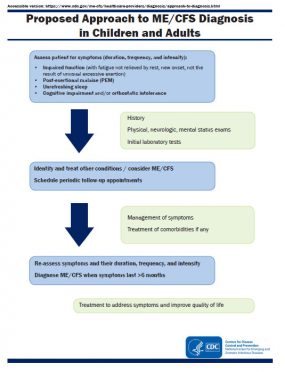

Persons with CFS may recover or improve over time, but some will become severely affected and disabled for an extended period. Proposed mechanisms include biological, genetic, epigenetic, infectious, and physical or psychological stress affecting the biochemistry of the body. Diagnosis is based on the person's symptoms because no confirmed diagnostic test is available. The unexplained and often incapacitating fatigue in CFS is different from that caused by normal strenuous ongoing exertion, is not significantly relieved by rest, and is not due to a previous medical condition. Frequently and variably, other common symptoms occur involving numerous body systems, and chronic pain is common. : 7 Orthostatic intolerance (difficulty sitting and standing upright) and cognitive dysfunction are also diagnostic.

Distinguishing core symptoms are lengthy exacerbations or flare-ups of the illness following ordinary minor physical or mental activity, known as post-exertional malaise (PEM) greatly diminished capacity to accomplish tasks that were routine before the illness and sleep disturbances. The causes and mechanisms of the disease are not fully understood. Worsening of symptoms with activity, long-term fatigue, others įemale sex, virus and bacterial infections, blood relatives with the illness, major injury, bodily response to severe stress and others : 1–2Ĭhronic fatigue syndrome ( CFS), also called myalgic encephalomyelitis ( ME) or ME/CFS, is a complex, debilitating, long-term medical condition. Rheumatology, rehabilitation medicine, endocrinology, Infectious disease, neurology, immunology, general practice, paediatrics, other specialists in ME/CFS Myalgic encephalomyelitis/ chronic fatigue syndrome (ME/CFS), myalgic encephalomyelitis (ME), post-viral fatigue syndrome (PVFS), chronic fatigue immune dysfunction syndrome (CFIDS), systemic exertion intolerance disease (SEID), others : 20 Medical condition Chronic fatigue syndrome


 0 kommentar(er)
0 kommentar(er)
